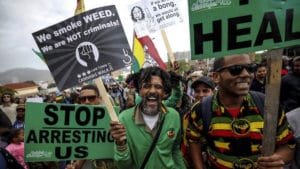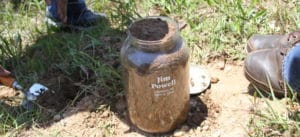
Police time and money go to pot
If dagga is decriminalised, R3.5-billion could be invested annually in serious crimes. It may take some of the pressure off the clogged-up court system, an overburdened police force, severely overcrowded prisons and see more successful prosecutions for murders such as that of Karabo Mokoena. On a sweltering summer evening in downtown Johannesburg, Larry lit up a joint. The previous day, he had experienced an attempted smash-and-grab and his nerves were still frayed. Larry, who isn’t using his given name, was
A history of American lynchings
A soil collection project is commemorating the forgotten victims of lynching and helping to tell their stories. Alabama, United States – It’s a sunny day in early May, in Thorsby, a small town in rural Alabama. As we make our way down Peachtree Drive, the houses begin to give way to trailers as the dusty road turns into a dirt track. It leads to a lake, trees lining its banks. This is where John B Smith, a 73-year-old civil rights

Op-Ed: The contrition clause of parole
While the parole system or parole boards cannot fix a wrongful conviction, the “contrition” requirement in the parole process currently functions as a quid pro quo for release. This is disproportionately punitive towards people who still maintain their innocence. Joseph Motsepe Setshedi has vowed to rather die in prison than admit guilt for a crime he says he never committed. Setshedi was convicted in 1999 for the 1995 murder of Bigboy, the boyfriend of Ga Rankuwa resident Joyce Newpham. Newpham

I Met with Martin Luther King Minutes Before He Was Murdered
He was the only man with the power to unite my militant black power group and his civil rights movement. Then, 49 years ago today, a single bullet changed history. By John Burl Smith, as told to Ruth Hopkins In the summer of 1967, I was back in my hometown, Memphis, Tennessee, after serving two years in Vietnam. I was a “young blood,” 24 years old, full of hope and promise. I had a job at the defense depot, owned a car and

Breaking the Silence of Lynchings in America
Ruth examines America’s repugnant history of lynchings and a project to remember its victims. A timely reminder of where we must refuse to return to. It’s a sunny day in Thorsby, a small town in rural Alabama. Trailers replace houses on Peachtree Drive, as the meandering dusty road turns into a dirt track. It leads to a lake, trees lining its banks. The serenity of this place – rippling water, rustling trees and a clear blue sky – belies its ugly

It is remembering, not looking away, that will help America deal with its ugly past
Ruth Hopkins reflects on her recent visit to the United States of America, where processes of truth telling reminded her of its history of slavery and lynching. She learned that it can actually be destructive not to acknowledge the pains, horrors and atrocities of the past. It is a natural human reaction to look away when confronted with injury or suffering. In this era of mass media where drowned refugee children wash up ashore and onto your screen and where